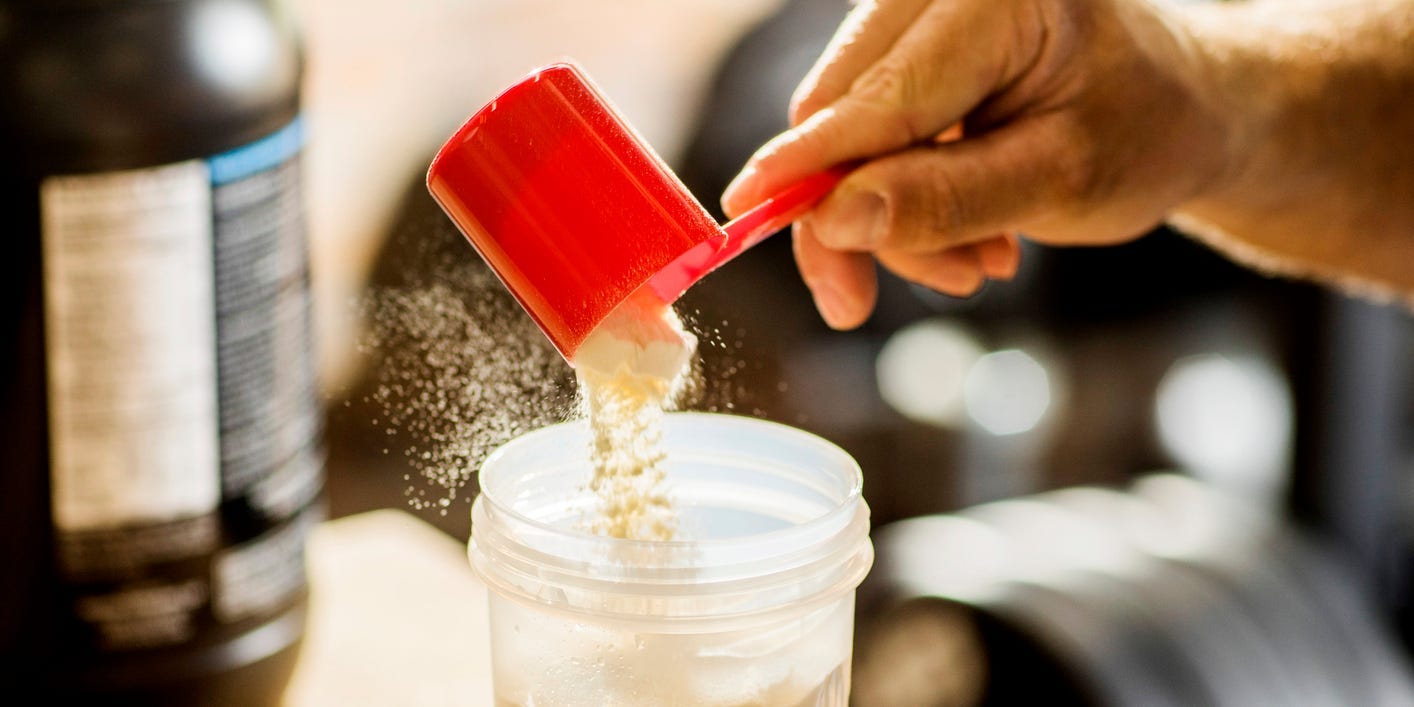
stevecoleimages/Getty Images
- Whey protein has many benefits like assisting with weight loss and muscle gain.
- Common side effects of whey protein include nausea, cramps, fatigue, and bloating.
- Do not take whey protein if you are lactose intolerant, pregnant, or breastfeeding.
- Visit Insider's Health Reference library for more advice.
Whey protein is one of the most popular and widespread protein supplements. It is often sold in powder form which can be added to smoothies, protein bars, and other foods or beverages.
Whey protein is derived from cow's milk, so it's not suitable for vegans or people with lactose intolerance. However, it's gluten-free, making it a safe option for lactose-tolerant vegetarians and those following gluten-free diets.
"Whey protein is used by elite athletes and weekend warriors alike as a means to build muscle mass," says Olivia Brant, RD, founder of Olivia Ashton Nutrition.
Besides building muscle, whey has many other benefits.
1. Whey is a complete protein
We need protein to build and maintain bones, muscles, and skin, but not all proteins are created equal. Whey is a notably high-quality protein because it's a complete protein.
Whey protein is also a "fast-acting" protein, absorbed by the body at a rate of about 10 grams per hour. In contrast, a cooked egg has an absorption rate of about three grams per hour.
"That's why it's best [to consume whey protein] immediately after a workout when your body is ready to use it," Brant says.
2. Whey protein builds muscle mass
Protein, including whey, can build muscle when combined with strength training. That's because muscle growth can increase if excess amino acids are in the bloodstream - particularly the amino acid leucine.
"Whey protein is high in amino acids like leucine, which help promote the repair and building of muscle mass," says Annamaria Louloudis, RDN, Founder of Louloudi Nutrition.
"If you're increasing calories by adding whey protein without putting in the work at the gym you will simply gain body fat," Brant says.
3. Whey protein assists with weight gain
Protein shakes are a popular choice for people trying to gain weight due to their high-caloric profile. They are also easy to add to, or replace, a meal if you're struggling to get enough protein and calories from your diet, says Louloudis.
Protein shakes are also used for weight maintenance by older adults and people experiencing involuntary weight loss.
"The elderly population typically has trouble with consuming enough protein due to trouble chewing and swallowing and decreased activity and appetite," Louloudis says. "In these cases, incorporating protein powder into a high-calorie liquid shake is a great way to get in calories and protein to help maintain weight."
4. Whey protein can help you lose weight
While whey protein won't magically burn away belly fat, it can keep you feeling fuller for longer and possibly increase the number of calories your body burns on a daily basis.
High-protein diets are also associated with an increased metabolic rate, or the number of calories your body burns each day to function normally.
"Protein has the highest Thermic Effect of Food (TEF) of all the macronutrients - meaning you burn more calories digesting and metabolizing protein than you do when you eat carbs or fat," Brant says. "This metabolic boost along with the satiating benefits of eating protein may help an individual more easily stay in a calorie deficit and lose weight."
5. Whey protein may help manage type 2 diabetes
Whey protein could help control blood sugar levels in people with type 2 diabetes that are non-obese. However, more studies are needed.
You should avoid whey protein if you are:
- Lactose intolerant
- Pregnant
- Breastfeeding
- Taking the medications Levodopa or Albendazole
Additionally, you should talk to your doctor before consuming whey protein if you're taking antibiotics, as it can affect how well they work.
Insider's takeaway
Whey is an accessible, high-quality protein option touting all nine essential amino acids, and is a safe option for most people trying to build muscle or gain weight.
"You just want to make sure you are getting a supplement that is 100% whey and doesn't have added sugars or fillers to get the most benefit," Louloudis says.